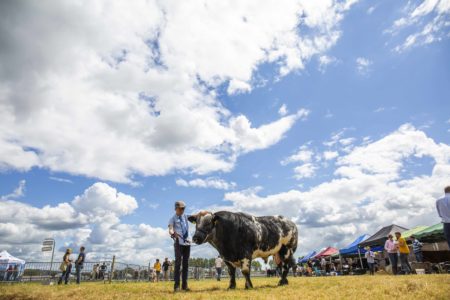14 March 2020
By Bryan Smyth
bryan@TheCork.ie
ICOS (the Irish Co-operative Organisation Society) represents over 130 co-operatives in Ireland – including the Irish dairy processing co-operatives and livestock marts – whose associated businesses have a combined turnover in the region of €14 billion, with some 150,000 individual members, employing 12,000 people in Ireland, and a further 24,000 people overseas.
ICOS, the representative body for the co-operative movement (including the dairy co-ops and livestock marts) has welcomed the protocols and strict measures enacted by dairy co-ops and livestock marts to prevent the spread of COVID-19.
ICOS President, Jerry Long said, “The COVID-19 pandemic is an unprecedented situation, which will test the solidarity of our society as we collectively work together to prevent the spread of the infection. Rural Ireland is renowned for its great community spirit. Please stay in touch with your neighbours and friends through this difficult period, perhaps best by phone, email, social media, and particularly with the elderly to ensure their care and wellbeing while observing all necessary HSE guidelines. I wish to welcome and acknowledge the business contingency plans put in place by co-ops throughout the country in recent weeks and the past number of days to ensure the agricultural economy continues to function as normal as we brace ourselves for the challenges that lie ahead.”
Dairy Co-operatives
ICOS has welcomed the strict protocols enacted by dairy co-ops to ensure that milk collection and milk processing will continue as normal while ensuring that social distancing takes place throughout the collection process.
This would typically entail the dairy farmer opening the dairy facilities for the milk collection vehicle and maintaining an appropriate distance from the driver until they depart. Where any farming family is affected by Coronavirus (e.g., a suspected or confirmed case), they should contact their co-operative directly to make milk collection arrangements and any such contact will be treated in the strictest confidence.
ICOS also confirmed that all its dairy processing members are continuing operations entirely as normal, while having in place all necessary infection prevention measures throughout their operations.
ICOS said the Government will need to consider adjustments to working time provisions to allow for maximum flexibility for workers and employers within the Organisation of Working Time Act. This will be important for the milk production and the processing sector which is very seasonal in nature and will soon enter the peak production period.
In particular, workers may unfortunately be affected by illness, requiring them not to work, and many will also have additional child care responsibilities. This could also require groups of workers to self-isolate and there needs to be flexibility in working arrangements to protect employment and also to ensure that milk will not have to be discarded. The Act allows for a relaxing of some provisions in the event of unforeseen or exceptional circumstances and this could be of benefit to employees and employers alike to ensure the full continuity of all operations.
Annual General Meetings
ICOS has written to all co-operative members who may soon be having AGMs to provide guidance in relation to the now elevated Government measures to counter the spread of the COVID-19 Coronavirus in communities.
Until at least 29th March 2020, the Government has said all indoor meetings of in excess of 100 people should not take place and this has natural implications in light of the forthcoming AGM season where it is also possible this advice may be extended for a further period after the end of March.
President of ICOS, Jerry Long said, “We have no guarantee as to when the restrictions might be lifted. Since most co-operatives have more than 100 members, and all members would generally be invited to attend an AGM, there is good reason to pause and consider what options co-operatives have with respect to the holding of their AGM, regardless of the numbers expected at any meetings.”
Long urged co-operative members firstly to check their rule books as to what would be feasible. “Irish co-operatives have an obligation to convene an annual general meeting within every financial year. They need to consider options in line with their financial year-end and whether or not the rules enable changes or postponements to the timings of AGMs. In most instances, co-operatives will gave good flexibility in this regard.”
“What we are saying is, if it is possible to hold off your AGM, then ICOS strongly recommends that you do so,” said Long. “This applies to AGMs and also for any intended SGMs. ICOS is ready to help with advice and assistance in relation to the rules and policies involved.
“While the currently unfolding events are unprecedented, it remains the case that the general meeting remains a cornerstone of the co-operative both in ethos and in law. For that reason, no one size will fit all and so we are urging co-operatives to consider all variables in making decisions appropriate to their individual circumstances.
MARTS
ICOS strongly re-iterated advice in relation to attendance at marts urging only people doing business to attend the marts.
It is especially important at this time to keep children and potentially vulnerable people, including elderly persons, AWAY from marts while the current Coronavirus risk is being addressed.
Only ‘trading customers’ should attend marts until further notice, i.e. only those buying or selling livestock.
Non-trading patrons must refrain from visiting until further notice up to 29th March 2020 when further guidance will be provided.
The number of people attending individual mart ringsides at any one time will be limited to 100, which will be managed on a strict rotation system, i.e. using admission cards which will be rotated among patrons at the entrance / exit to the mart ringside or other such monitoring methods as devised by the mart.
Covid-19 Coronavirus is a general public health issue. Relevant information is available at www.hse.ie


